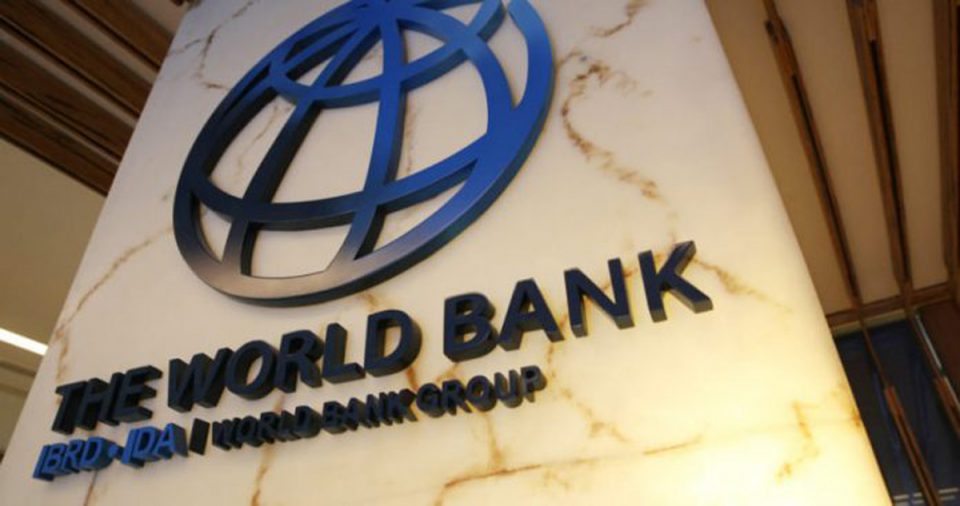Photo caption: World Bank logo
The World Bank has reiterated its projection that the Nigerian economy would grow by 3.6 per cent in 2025 despite the shift in the global trade dynamics.
This was disclosed in its twice-yearly Global Economic Prospects report released on Tuesday, where it slashed its forecasts for nearly 70 per cent of all economies, including the United States, China, and Europe, as well as six emerging market regions, from the levels it projected just six months ago, before US President Donald Trump took office.
The World Bank also slashed its global growth forecast for 2025 by 0.4 percentage points to 2.3 per cent, saying that higher tariffs and heightened uncertainty posed a “significant headwind” for nearly all economies. It warned that global growth could be weaker than projected if global trade tensions were to escalate further.
Earlier in the year, the World Bank projected that Nigeria’s economy would grow by 3.6 per cent in 2025, building on an estimated expansion of 3.4 per cent in 2024, as key macroeconomic reforms begin to stabilise the business environment.
However, in its latest report, the bank stated, “Growth in Nigeria is forecast to strengthen to 3.6 per cent in 2025 and to an average of 3.8 per cent in 2026-27. Following monetary policy tightening in 2024 to address rapid currency depreciation, inflation is projected to decline gradually.
“Domestic reforms have helped spur investment, supporting growth in the services sector, especially in financial services and information and communication technology.
Services activity will continue to be the main driver of growth, while the industrial sector will remain constrained by subdued crude oil production as last year’s slight rebound wanes.”
It affirmed that the global risks of the trade wars will be limited in Nigeria and the rest of sub-Saharan Africa.
The bank further stated, “The direct impact on SSA growth of further escalation in global trade tensions may be contained owing to the limited direct exposure to export markets in China and the United States, apart from commodity demand.”
The direct effects of the increased U.S. trade barriers on SSA economies are expected to be contained, as the region exports relatively few manufacturing goods to the United States. However, should trade fragmentation increase further or lead to a sharper slowdown in global growth, the adverse effects on SSA economies could be considerable due to their dependence on commodity trade.
“Indeed, a worse-than-expected economic slowdown in China would adversely affect the demand for minerals and metals. Lower prices for these commodities, which are the main exports of several SSA countries, would have particularly negative effects on these countries through diminished economic activity and even tighter fiscal space.”
On the other hand, should global trade tensions subside, the growth outlook for SSA would benefit from improved global economic activity, lower export tariffs, higher demand for commodities, reduced uncertainty, and stronger global investors’ risk appetite.
However, it raised concerns about the vulnerability to violence and its impact on economic activities: “Levels of violence in SSA remain high, weighing on economic activity. While public debt-to-GDP ratios are expected to decline gradually, debt servicing costs remain elevated, limiting fiscal space in many SSA economies for development-promoting expenditures, especially given the recent rise in sovereign spreads.
“Further declines in official development assistance inflows risk worsening humanitarian and fiscal challenges. The share of the population affected by adverse weather events, which destroy crops and dampen economic activity, has increased sharply in recent years.”
Recall that last Thursday, the United States Ambassador to Nigeria, Richard Mills Jr, said that the US will be focusing on private sector-led investment instead of aid in its engagement with Nigeria and sub-Saharan Africa, henceforth indicating the drying up of funds for certain critical services that had been supported by US aid.
Meanwhile, the World Bank also stated that the per capita income in Nigeria and SSA is projected to expand by an average of 1.6 per cent a year in 2025-27, with growth in 2025 revised down by 0.4 percentage points.
The World Bank report further highlighted, “This pace would mean that, in terms of living standards, the region would fall even further behind other emerging markets and developing economies, excluding China and India. These per capita income gains will remain inadequate for significantly reducing extreme poverty in the region, home to most of the world’s poor.
“Per capita income growth in SSA is also expected to remain uneven, with incomes falling in some countries, particularly those plagued by violent conflict. By 2027, per capita income in over one-fourth of the region’s economies will not have recovered to their pre-pandemic levels. Lifting per capita incomes and reducing extreme poverty in the region are likely to remain difficult as the jobs challenge intensifies in the coming years. The projected increase in SSA’s working-age population is set to rise rapidly over the next five years and almost double between 2025 and 2050, the largest numerical increase that any region has recorded over a 25-year period.”
While the population growth can be viewed from a positive standpoint, the bank said the absence of policies to reinvigorate growth and address longstanding structural bottlenecks will mean that economies in SSA will not be able to generate the jobs required for their expanding working-age population.



